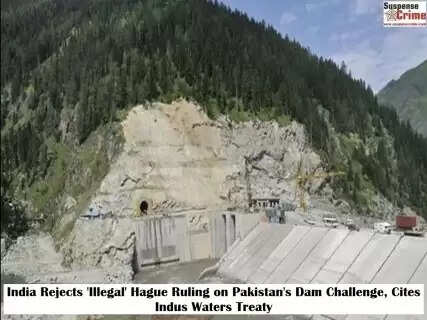
Suspense crime, Digital Desk : India has unequivocally rejected a ruling by the Permanent Court of Arbitration (PCA) in The Hague, which claimed jurisdiction over a water dispute with Pakistan concerning two Indian hydroelectric projects. Labeling the proceedings an "illegal charade," New Delhi has made it clear that it will not recognize the court's authority, escalating a long-standing conflict over the interpretation of the Indus Waters Treaty.The dispute centers on Pakistan's objections to the designs of India’s 330 MW Kishenganga and 850 MW Ratle hydroelectric projects, located in the Kashmir region. Pakistan has argued that the projects violate the terms of the 1960 Indus Waters Treaty (IWT), a crucial water-sharing agreement between the two nations brokered by the World Bank.In a significant procedural win for Islamabad, the Hague-based court declared that it possessed the "competence" to hear the case. However, India has vehemently opposed this from the start.In a strongly-worded statement, India’s Ministry of External Affairs reiterated its long-held position that Pakistan's unilateral move to approach the PCA was a breach of the Indus Waters Treaty itself. India argues that the IWT lays out a specific "graded mechanism" for dispute resolution. According to this process, disagreements should first be handled by a "Neutral Expert." Only if that expert determines that the issue involves a complex matter of treaty interpretation should it be escalated to a Court of Arbitration.India maintains that Pakistan sidestepped this mandatory, sequential process by directly approaching the arbitration court. New Delhi has consistently advocated for the appointment of a Neutral Expert as the correct next step.The Indian government stated that it was "compelled to issue a notice for modification of the Indus Waters Treaty" in January 2023 due to Pakistan's "intransigence." While India remains open to bilateral negotiations to resolve the issue, it will not participate in what it considers illegitimate proceedings at The Hague.This decision creates a significant legal and diplomatic standoff. By refusing to recognize the court's jurisdiction, India will not be a party to any further hearings. The court may proceed without India's participation (ex parte), but any subsequent ruling would be unenforceable in India and would further strain the already fragile framework of the historic water-sharing treaty.Keywords:
Around the web

